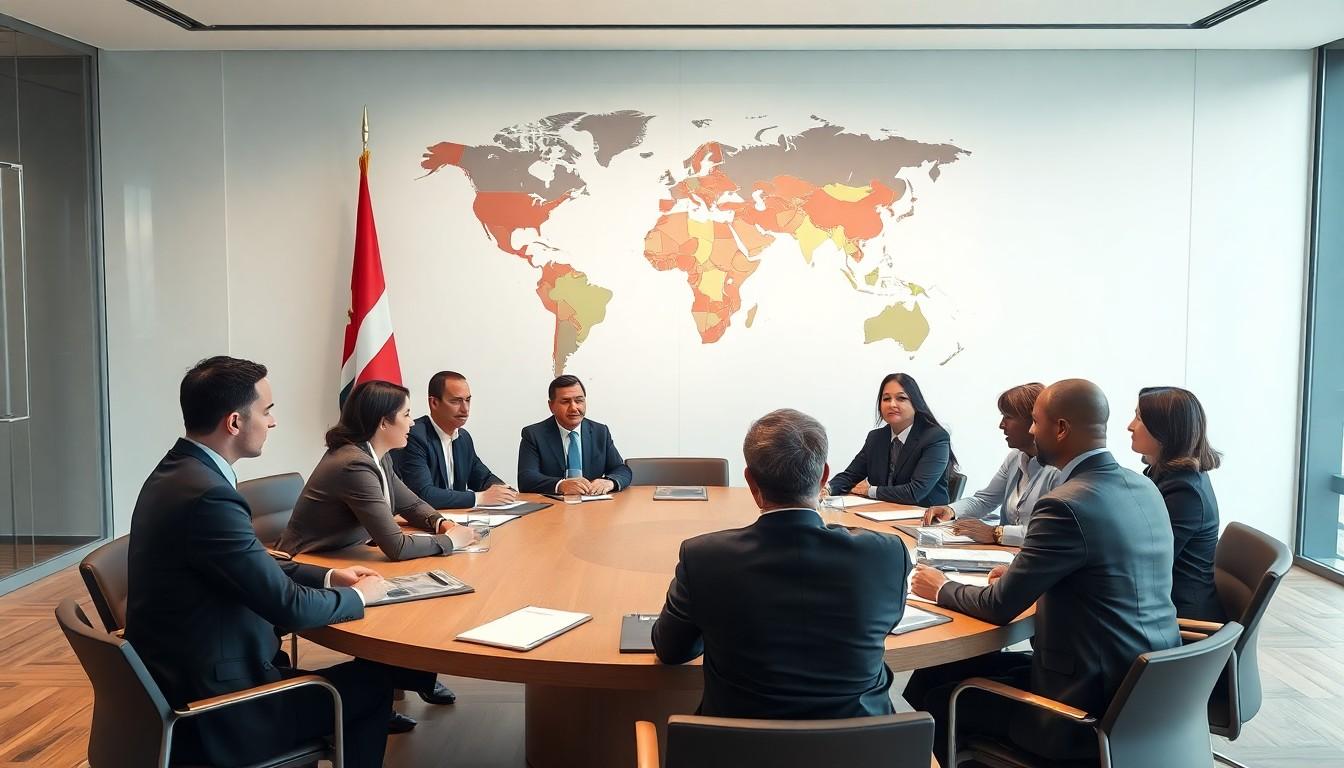The Best Fluffy Pancakes recipe you will fall in love with. Full of tips and tricks to help you make the best pancakes.

International Relations Theory: Unraveling the Secrets Behind Global Politics Today
International relations theory might sound like a subject reserved for stuffy classrooms and endless debates, but it’s so much more than that. It’s the secret sauce behind the world’s political shenanigans, helping to explain why countries behave the way they do—like a soap opera but with nuclear weapons.
From power struggles to alliances that rival the best buddy comedies, understanding these theories can make anyone the life of the party at their next geopolitical discussion. Whether it’s realism, liberalism, or constructivism, each theory offers a unique lens to view the global stage. So buckle up as we dive into the fascinating world of international relations theory, where every twist and turn could make or break the next big diplomatic deal.
International Relations Theory
International relations theory encompasses various frameworks that explain the interactions between states and non-state actors in the global arena. Realism, one of the primary theories, emphasizes the anarchic nature of international politics, focusing on power dynamics and national interests. Key proponents of realism argue that states act primarily in pursuit of their self-interests, often leading to competition and conflict.
Liberalism offers a contrasting view. It underscores the potential for cooperation among nations, highlighting the importance of international institutions and democratic governance. Proponents believe that economic interdependence and mutual benefits can reduce conflicts and foster global stability.
Constructivism further broadens the discussion by exploring the impact of social identities and beliefs on international relations. This theory posits that shared norms, values, and historical contexts shape state behavior, illustrating that perceptions often drive foreign policy decisions.
Critical theories challenge conventional views by examining the role of power structures and inequalities. Feminist and post-colonial perspectives question the traditional assumptions, advocating for a more inclusive understanding of global affairs. They argue that narratives often overlook marginalized voices, emphasizing the need for diverse viewpoints in analyzing international relations.
Each of these theories contributes to a richer understanding of global affairs. Engaging with these frameworks helps clarify the complexities of diplomacy, conflict resolution, and international cooperation. As scholars and practitioners delve into these theories, they gain insights essential for navigating the multifaceted challenges of today’s geopolitical landscape.
Key Theoretical Approaches

International relations theory encompasses various approaches that illuminate global political dynamics.
Realism
Realism provides a lens focused on the anarchic nature of international politics. It emphasizes power dynamics and national interests as primary motivators for state behavior. States often prioritize survival and military strength, viewing the international arena as a competitive environment. Leading theorists like Hans Morgenthau argue that moral norms do not overshadow the quest for power. Consequently, pragmatic assessments of national interests guide foreign policy decisions. Critics argue realism neglects the potential for cooperation, yet its insights remain vital for understanding conflicts.
Liberalism
Liberalism shifts focus towards cooperation and interdependence among states. This paradigm highlights the role of international institutions in fostering peace and stability. Economic ties create incentives for states to work together, making war less likely. Key figures such as Robert Keohane advocate for the significance of global governance structures. Additionally, liberalism acknowledges the importance of democracy and human rights in shaping international relations. This approach provides a counterbalance to the more cynical view of realism, promoting a vision of a collaborative global order.
Constructivism
Constructivism challenges traditional theories by emphasizing the role of social identities and shared norms. This approach argues that state behavior is not solely determined by material factors but also by social context. Key theorists like Alexander Wendt highlight how identities shape national interests and influence interactions. Norms and values play a critical role in defining state behavior, as states adopt collective meanings over time. Constructivism encourages a nuanced understanding of global politics, bringing attention to the complexities behind national interests and interactions.
Major Schools of Thought
International relations theory encompasses various schools of thought, each providing unique insights into global politics.
Traditionalism
Traditionalism serves as one of the foundational perspectives in international relations. It emphasizes the significance of historical and cultural contexts in shaping state behavior. Traditionalism often focuses on the role of great powers and important events, including wars and treaties, in influencing international dynamics. Scholars within this school examine the philosophical underpinnings of diplomacy and the historical evolution of states. Notable figures, such as E.H. Carr, argue that morality in politics often takes a backseat to interests and power struggles. This school highlights the need to understand historical narratives to grasp current international issues.
Behavioralism
Behavioralism marks a shift towards a more empirical approach in international relations. Researchers in this field prioritize the use of scientific methods and data analysis to study state behavior. By focusing on observable actions, behavioralism aims to identify patterns and make predictions about international phenomena. This school advocates for the importance of quantitative research and statistical analysis to enhance understanding. Prominent theorists, including David Easton, insist on integrating empirical research into discussions of power and governance. The emphasis on measurable behaviors allows for a more systematic exploration of international trends.
Critical Theory
Critical theory challenges established norms and power structures within international relations. This perspective highlights the importance of addressing social injustices and inequities in global politics. Critical theorists aim to uncover underlying assumptions and biases in traditional paradigms. They advocate for perspectives often marginalized in mainstream discourse, such as feminist and post-colonial viewpoints. Scholars like Jürgen Habermas emphasize the role of dialogue in fostering understanding and cooperation among states. By prioritizing diverse viewpoints, critical theory aims to reshape discussions around power and ethics in international relations.
Contemporary Developments
Recent developments in international relations theory extend beyond traditional paradigms, emphasizing diverse perspectives and new challenges.
Post-Colonialism
Post-colonialism analyzes the impact of colonial legacies on global power dynamics. This framework critiques how colonial histories shape contemporary state relations and influence identity formation. Scholars like Edward Said highlight the ongoing effects of imperialism, particularly regarding cultural representations and power structures. By examining the perspectives of formerly colonized nations, post-colonialism offers insights into ongoing inequalities in global politics. Such analysis contributes to a richer understanding of international conflicts and promotes the inclusion of diverse voices in policy discussions.
Feminism in International Relations
Feminism in international relations challenges traditional concepts of power and security. This perspective highlights how global issues disproportionately affect women and marginalized communities. Key theorists like Cynthia Enloe argue that traditional security approaches overlook the gendered dimensions of conflict and cooperation. Feminist analysis uncovers the social and political contexts that shape state behavior, advocating for policies that address gender-based violence and inequality. By emphasizing the role of women in peace processes, this framework contributes to a more comprehensive understanding of diplomacy and global governance.
Environmental Perspectives
Environmental perspectives emphasize the intersection of ecological challenges and international relations. Climate change poses significant threats to global stability and security. Scholars argue that environmental degradation can exacerbate conflicts over resources, prompting states to reassess their strategies. Approaches such as ecocriticism examine how ecological concerns shape state interactions and influence policy decisions. International cooperation on environmental issues, therefore, becomes crucial to addressing shared global threats. This perspective encourages a collaborative approach to diplomacy, highlighting the importance of sustainability in contemporary international relations.
International relations theory serves as a vital lens through which to understand the complexities of global interactions. By examining various frameworks such as realism, liberalism, and constructivism, individuals can gain deeper insights into the motivations and behaviors of states. The evolving nature of these theories reflects the dynamic landscape of international politics, highlighting the importance of cooperation and diverse perspectives.
As the world faces pressing challenges like climate change and social inequality, engaging with these theoretical approaches becomes increasingly essential. They not only enhance discussions about geopolitical issues but also inform strategies for effective diplomacy and conflict resolution. Understanding these theories equips individuals to navigate the intricate web of international relations in a more informed manner.
